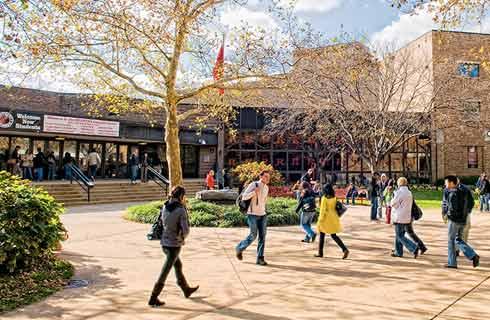荣誉地球科学理学学士
Honours Bachelor of Science in Geoscience - St. George

学历文凭
Bachelor Degree with Honours

专业院系
Faculty of Arts and Science

开学时间

课程时长

课程学费

国际学生入学条件
- Biology (SBI4U) is recommended
- Calculus & Vectors (MCV4U)
- Chemistry (SCH4U)
- English (ENG4U)
- Physics (SPH4U) is recommended and equivalent qualifications.
IDP—雅思考试联合主办方

雅思考试总分
6.5
- 雅思总分:6.5
- 托福网考总分:89
- 托福笔试总分:160
- 其他语言考试:Pearson Test of English (PTE) Academic - Overall score of 65 with no part below 60.
CRICOS代码:
申请截止日期: 请与IDP联系 以获取详细信息。
课程简介
The three specialist programs – Geology, Environmental Geoscience, and Geophysics (offered in collaboration with the Department of Physics) – give students the skills to enter graduate studies and also allow them to become professional “geoscientists in training” after graduation. The Geology specialist program focuses on processes of the solid planetary bodies, including volcanoes, sedimentary environments, mountain building, the formation of minerals or ores, and Earth through time. The Environmental Geosciences specialist program in addition addresses processes related to groundwater and biochemical activities. The Geophysics specialist program allows students to model physical processes in and on Earth and other planets and to apply non-invasive methods of imaging the subsurface, often in 4D (i.e., space and time); targets may range from archaeological investigations to groundwater imaging and mineral exploration, but also include modeling of mountain-building processes and planetary magnetic fields.The Geoscience Major program builds on a set of core courses and allows students to select elective courses that match their particular interests. Students have paired this program not just with other science programs but such diverse fields as geography, archaeology, economics, history, political science, or peace and conflict studies.The Earth and Environmental Systems Major program takes a holistic approach to understanding how the Earth system works and how it has evolved over tens to millions and billions of years. This requires understanding the dynamics and interactions of all aspects of the system (solid Earth, ocean, atmosphere, and biosphere) and provides the larger context at a time when climate change, resource consumption and global pollution weigh heavily on people and societies.Our programs emphasise hands-on lab and field work. At least one field course is required in each program, and several courses have offered optional one-day to two-week long trips. In recent years courses have travelled to Newfoundland, Texas, Arizona, Hawaii, Chile, and New Zealand, and small groups of undergraduates have been involved with field research in Turkey, Peru, Greece and South Africa. These field training opportunities foster the establishment of peer networks, develop team-working skills, afford hands-on learning, and allow for a close collaboration and mentoring experience between individual students and instructors. Students are also encouraged to take advantage of extra and co-curricular opportunities such as study abroad, summer abroad, internships, or working in industry and non-governmental organizations.
相关申请
 预科
预科 奖学金
奖学金 实习机会
实习机会 在校学习
在校学习 跨境学习
跨境学习 校园授课-线上开始
校园授课-线上开始 在线/远程学习
在线/远程学习
开学时间&学费
学费信息仅供参考,请与IDP联系以获取详细信息
| 开学时间 | 时长 | 学费 | 地点 |
|---|
学校排名

世界排名21
数据源:
泰晤士高等教育世界大学排名
关于多伦多大学

多伦多大学(University of Toronto),始建于1827年,坐落在加拿大的第一大城市多伦多,是加拿大的一所顶尖学府,亦为加拿大传统四大校之一。安大略省政府及议会环绕在市中心的女王公园四周,现已发展成为一所“一主两翼”格局的世界知名研究性大学--坐落于市中心的圣乔治校区(St. George),历史最为悠久,与3个更小的大学联盟并有享有七大学院制,与十座教学医院有着密切关系;东西向延伸至世嘉堡与密西沙加,UTSC有着乡村般的风光,风景别致,搭乘TTC一小时路程;UTM则是在西边,有校车往返。在学术及研究方面,多伦多大学一直处于领先地位。其经费、捐款、国家教授奖项、研究出版规模和藏书量皆为加拿大之首。多伦多大学出版社在加拿大乃至全北美影响深远。实行独立书院制的学府,荣获诺贝尔奖的教授人数是加拿大最多的。维多利亚学院是其最富有的学院之一 提供更多奖学金和相关设施。多伦多大学亦为美国大学协会中仅有的两所非美国学府之一。多伦多大学每年发表的科研论文数量在北美仅次于哈佛大学,引用数量位居世界前五。主要贡献:干细胞及胰岛素的发现,电子起搏器、多点触摸技术、电子显微镜、抗荷服的发明和发展,NP完全理论,以及发现首个经核证的黑洞。
本校相关课程
其他相关课程

地球科学哲学博士
 滑铁卢大学
滑铁卢大学学历文凭
Ph.D.
开学日期
课程费用总额


地球科学(荣誉)理学学士
 圣弗朗西斯泽维尔大学
圣弗朗西斯泽维尔大学学历文凭
Bachelor Degree with Honours
开学日期
课程费用总额


环境地球科学(荣誉)理学学士
 阿卡迪亚大学
阿卡迪亚大学学历文凭
Bachelor Degree
开学日期
课程费用总额


环境地球科学理学学士
 阿卡迪亚大学
阿卡迪亚大学学历文凭
Bachelor Degree
开学日期
课程费用总额


地球科学理学硕士
 布鲁克大学
布鲁克大学学历文凭
Masters Degree
开学日期
课程费用总额


哲学地质科学博士
 曼尼托巴大学
曼尼托巴大学学历文凭
Ph.D.
开学日期
课程费用总额
















